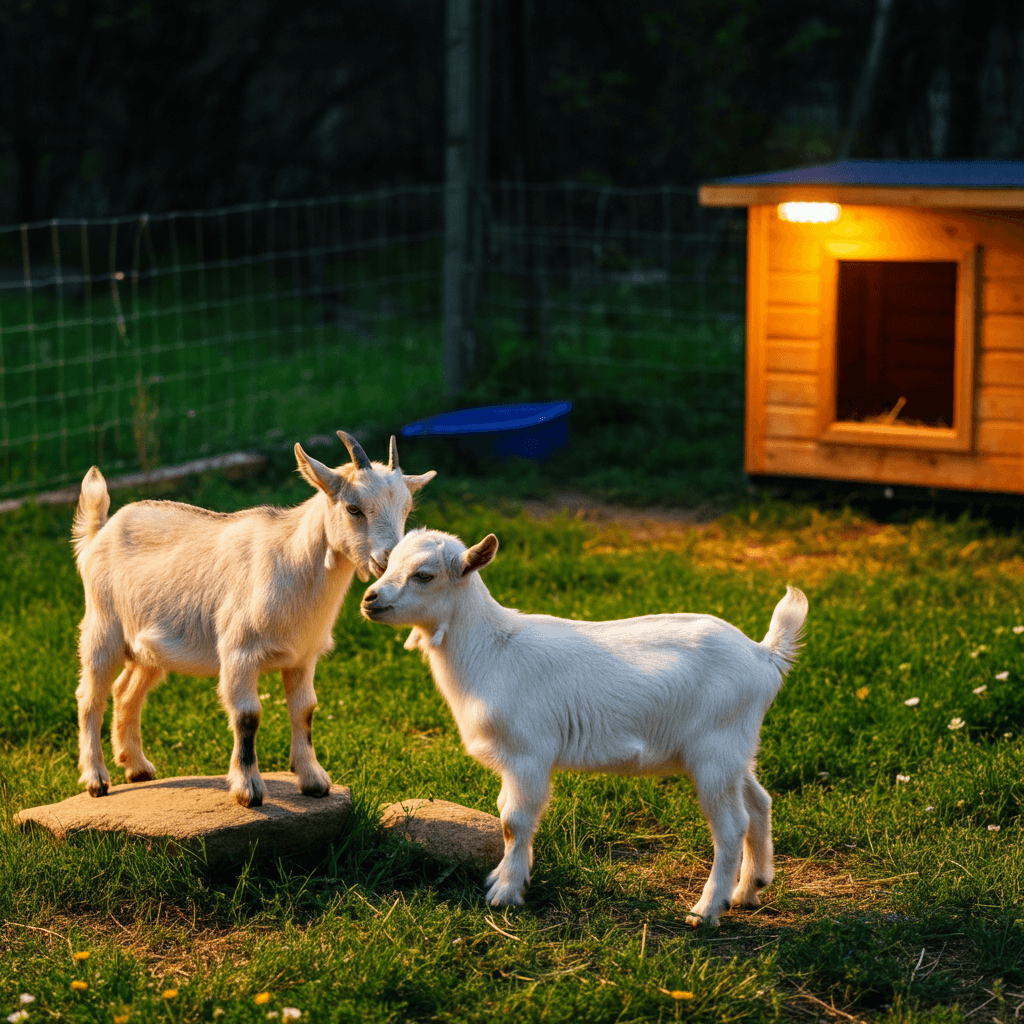Thinking of adding pygmy goats to your backyard farm? You’re not alone! With their charming personalities, compact size, and relatively simple care requirements, pygmy goats have become a favorite among homesteaders and hobby farmers alike.
This ultimate guide will teach you everything you need to know about raising goats—from housing and feeding to health care and practical tips for small spaces. Whether you’re new to backyard farming or looking to expand your livestock, this guide has you covered.
What Are Pygmy Goats
Pygmy goats are small, hardy goats that originated in West Africa. They’re known for their friendly nature, making them great companions for both adults and children. Unlike larger goat breeds, pygmies require less food and space, making them perfect for backyard farms or urban homesteads.
Typical pygmy weigh between 50 to 80 pounds and stand about 16 to 23 inches tall. Despite their small stature, they are energetic and love to climb and explore, so be prepared to provide them with an environment that matches their curious nature.
Why Choose Pygmy Goats
Here’s why more and more folks are welcoming pygmy into their backyard farms:
- Low Maintenance They require less space, time, and food than larger livestock.
- Family-Friendly Their playful and gentle nature makes them ideal for households with children.
- Great Milk Producers Even though they’re small, pygmy does (females) can produce a surprising amount of rich milk.
- Affordable Start-Up Costs Compared to larger livestock, pygmies are cost-effective to purchase and maintain.
How to Raise Pygmy Goats A Step-by-Step Guide
1. Check Local Regulations
Before getting started, check with your local authorities or HOA to ensure that keeping goats is permitted in your area. Some communities have specific regulations regarding livestock, such as acreage requirements, noise ordinances, and housing standards.
2. Build a Suitable Shelter
Pygmy are hardy animals, but they need shelter to protect them from the elements. Here’s what a proper goat shelter should include:
- Size Requirements Provide at least 10 square feet per goat.
- Weather Protection Ensure the shelter is well-insulated for winter and ventilated for summer.
- Dry Flooring Avoid wet or muddy areas; consider adding straw or wood shavings as bedding.
Adding a heat lamp in winter can help keep your pygmy warm during cold spells.
3. Set Up Fencing
Goats are excellent escape artists, so secure fencing is a must! Opt for sturdy fencing at least 4 feet high to prevent climbing and escape. Electric fencing can also be a great option to keep predators out.
Ensure the enclosure includes enough space for your goats to roam, climb, and play. Adding rocks or wooden platforms can provide enrichment and satisfy their natural urge to climb.
4. Feed Your Pygmy Goats
Proper feeding is essential for the health and happiness of your goats. Here’s what they need:
- Hay A staple for pygmy, hay should make up the bulk of their diet. Alfalfa in moderation is a great source of nutrients.
- Pasture or Browse Goats love to graze and forage for shrubs, weeds, and grasses.
- Grain When necessary, supplement with goat-specific grain, especially for nursing does or pregnant goats.
- Mineral Supplements Provide a loose mineral supplement specifically for goats to ensure they receive essential nutrients.
Avoid overfeeding grains, as pygmy are prone to obesity. A fat goat can develop health complications, so watch their weight closely.
5. Maintain Their Health
Keeping pygmy goats healthy requires routine maintenance and vigilance. Here are the basics:
- Hoof Trimming Trim their hooves every 6 to 8 weeks to prevent overgrowth and infections.
- FAMACHA Scoring Regularly check for signs of anemia caused by parasites like barber pole worms.
- Vaccinations Consult a vet to ensure your goats are up-to-date on vaccinations.
6. Socialization
Goats are highly social creatures and don’t do well alone. Always keep at least two goats together to meet their social needs. They’ll keep each other company and help prevent boredom, which can lead to destructive behavior.
Beginner-Friendly Tips for Raising Pygmy Goats
- Start Small Begin with two or three pygmy goats before expanding your herd.
- Keep Records Track vaccinations, worming schedules, and other care details to stay organized.
- Stay Observant Learn to recognize the signs of a healthy goat (bright eyes, shiny coat, good appetite) and act quickly if something seems off.
- Get a Good Vet Having a vet experienced with goats is invaluable for both routine care and emergencies.
Cost of Raising Pygmy Goats
Here’s a breakdown of the typical costs involved in raising pygmy goats:
- Initial purchase price per goat $50 to $250
- Shelter materials $100 to $500
- Fencing materials $100 to $400
- Monthly feed costs $25 to $50 per goat
- Yearly vet care $100 to $200
Overall, pygmy goats are an affordable addition to your backyard farm, especially compared to larger livestock.
Common Mistakes to Avoid
- Underestimating Space Needs Even small goats need room to roam and play.
- Improper Fencing Goats are escape artists; weak fencing can lead to lost goats and headaches.
- Feeding Mistakes Overfeeding grain or feeding multi-species livestock feed can cause health issues.
- Neglecting Social Needs Goats should never be kept alone.
FAQs About Raising Pygmy Goats
How much space do pygmy goats need?
Each pygmy goat requires at least 200 square feet of outdoor space and 10 square feet of shelter space.
Are pygmy goats good for milk?
Yes! Pygmy does produce rich, creamy milk that is excellent for drinking, cheese-making, and soap-making.
Can pygmy goats live in small backyards?
Absolutely! With proper fencing and care, pygmy goats thrive in small backyard setups.
How long do pygmy goats live?
With good care, pygmy goats can live 10 to 15 years.
Are pygmy goats hard to care for?
Not at all. Pygmy goats are low-maintenance animals as long as their basic needs are met.
Take the First Step Towards Raising Pygmy Goats
Raising pygmy goats can be a rewarding experience for aspiring homesteaders and backyard farmers. With their playful personalities, manageable size, and practical benefits (hello, fresh milk!), they’re a fantastic choice for small-scale farming.
If you’re ready to take the leap, start planning your goat-friendly backyard today! For more tips and expert advice, be sure to explore our homesteading guides or leave a comment below with your questions.





I’d should verify with you here. Which is not one thing I normally do! I get pleasure from reading a submit that can make individuals think. Additionally, thanks for permitting me to remark!